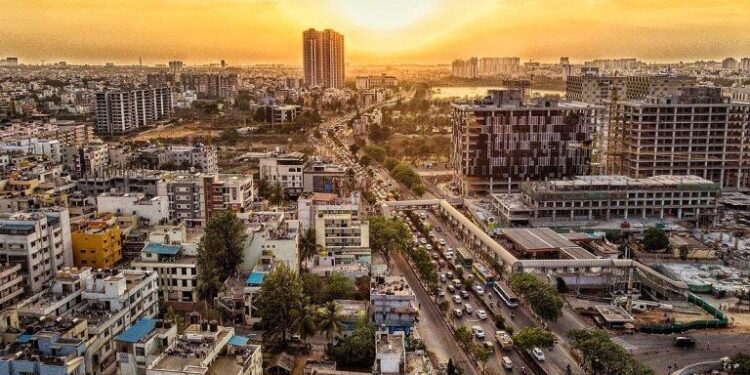In a compelling call to action, prominent entrepreneur and investor Mohandas Pai has urged Karnataka’s Deputy Chief Minister DK Shivakumar to prioritize the urgent repair and enhancement of Bengaluru’s ailing infrastructure. The city, often hailed as the Silicon Valley of India, has been grappling with myriad challenges, including traffic congestion, inadequate public transport, and deteriorating roads, which are causing deep concern among the business community. Pai’s remarks come in the wake of growing fears that these infrastructural shortcomings could hinder the city’s economic growth and diminish its appeal as a global business hub. As Bengaluru continues to attract startups and established companies alike, the spotlight now falls on the government’s role in addressing these critical issues to restore confidence among investors and entrepreneurs.
Bengaluru’s Infrastructure Crisis: Mohandas Pai Calls for Urgent Reforms to Restore Business Confidence
In a candid appeal to Karnataka’s Deputy Chief Minister DK Shivakumar, prominent industrialist Mohandas Pai has shed light on the pressing infrastructure challenges plaguing Bengaluru, a city once heralded as the Silicon Valley of India. Business leaders in Bengaluru are increasingly vocal about their dissatisfaction with the deteriorating state of the city’s roads, public transport systems, and overall urban planning. This infrastructure crisis is not merely an inconvenience; it poses a significant risk to the economic vitality of the region, causing many businesses to reconsider future investments. Pai emphasized that urgent reforms are essential to restore business confidence, citing a growing sentiment among entrepreneurs that the city is becoming less hospitable for innovation and growth.
Among the specific issues highlighted by Pai are the escalating traffic congestion, inadequate waste management, and insufficient housing for the migrant workforce that fuels the city’s economy. He outlined the urgent need for a cooperative approach between government authorities and private sector stakeholders to formulate and implement effective strategies. Key recommendations include:
- Streamlined regulatory processes to facilitate quicker approvals for infrastructure development projects.
- Investment in public transport to alleviate congestion, which currently hampers productivity.
- Improved waste management systems to ensure cleanliness and wellness in urban areas.
With the right reforms and collaborative efforts, Bengaluru could reclaim its status as a global business hub, ensuring that the aspirations of its entrepreneurs are no longer stifled by infrastructural inadequacies.
Expert Recommendations for Revamping Urban Infrastructure in Bengaluru
As urban challenges mount in Bengaluru, experts are increasingly emphasizing the need for a comprehensive overhaul of the city’s infrastructure to support its burgeoning population and economic landscape. Key recommendations include:
- Integrated Public Transport Systems: Developing a cohesive network combining buses, metro services, and suburban trains to ease congestion and provide reliable transit options for residents.
- Smart Waste Management Solutions: Implementing technology-driven systems for waste collection and disposal that ensure efficiency and promote recycling.
- Water Management Initiatives: Modernizing water distribution systems and investing in rainwater harvesting to address scarcity issues faced by the city.
- Green Spaces and Urban Planning: Prioritizing the creation of parks and green corridors to enhance the urban ecosystem and improve residents’ quality of life.
In addition, a focus on digital infrastructure is critical for supporting businesses and facilitating growth. Recommended strategies include:
| Area | Recommendation |
|---|---|
| Communication | Expand broadband and mobile internet access to ensure connectivity for all, fueling innovation. |
| Data Management | Invest in smart technologies for urban data collection to enable informed decision-making. |
| Public Engagement | Develop platforms for citizen feedback on infrastructure projects to ensure transparency and accountability. |
Addressing these key areas not only promises to revitalize Bengaluru’s infrastructure but also positions the city as a competitive hub for businesses and talent alike, alleviating the concerns voiced by stakeholders like Mohandas Pai.
The Economic Impact of Neglected Infrastructure on Bengaluru’s Business Environment
The ramifications of outdated and poorly maintained infrastructure in Bengaluru are manifesting as significant barriers to business growth and investment. With an influx of start-ups and established enterprises, the city’s roads, public transport systems, and utilities are struggling to keep pace. This has led to a host of challenges for businesses, including:
- Increased Operating Costs: Businesses face higher logistics costs due to traffic congestion and inadequate transport facilities, forcing them to divert resources that could otherwise fuel innovation and expansion.
- Decreased Competitiveness: Inconsistent power supply and poor internet connectivity curtail productivity, placing companies at a disadvantage compared to smoother-operating competitors in other regions.
- Talent Drain: As working conditions deteriorate, top talent may consider relocating to cities with better infrastructure, limiting the human resources available for local firms.
Furthermore, the neglect of infrastructure development has broader implications for economic stability, as a lack of investment fosters uncertainty among stakeholders. Recent surveys indicate that a considerable percentage of business leaders in Bengaluru feel apprehensive about the future due to:
| Concern | Percentage of Businesses Affected |
|---|---|
| Traffic Congestion | 78% |
| Power Failures | 62% |
| Water Supply Issues | 59% |
These concerns underline the urgent need for comprehensive infrastructure reforms, as ascertained by business leaders like Mohandas Pai. A concerted effort to address these issues could not only alleviate current business fears but also stimulate long-term economic growth for Bengaluru, further solidifying its status as a startup hub and a global business destination.
In Summary
In conclusion, the urgent call from Mohandas Pai to Karnataka’s Deputy Chief Minister DK Shivakumar serves as a critical reminder of the pressing infrastructure challenges facing Bengaluru. With businesses expressing their fears about the city’s deteriorating conditions, it is clear that immediate and effective action is necessary to restore confidence among investors and residents alike. As the economic engine of the state, Bengaluru’s prosperity hinges on its ability to address these infrastructural woes. The eyes of entrepreneurs and citizens now turn towards Shivakumar and his administration, as they navigate the complex landscape of urban development and seek to ensure that the city not only keeps pace with its growth but thrives in the years to come. Balancing development with sustainability will be key in crafting a resilient future for India’s tech capital.














